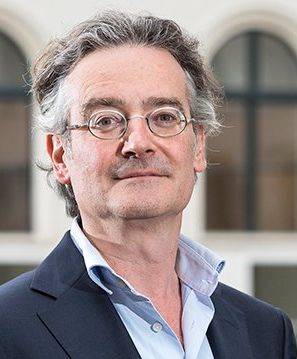Prof. dr. B. J. P. (Bas) van Bavel
Summary of research
Bas van Bavel is distinguished faculty Professor of Transitions of Economy and Society at Utrecht University (UU). He examines how societies develop in the long run. His aim is to uncover why some societal arrangements are successful and others are not. He examines this by comparing societies in different regions (in Europe and the Middle East) and time frames (from pre-industrial to modern times) from an interdisciplinary perspective, combining economic variables (such as GDP per capita or wealth) with social (equity and welfare) and ecological (sustainable use of resources) variables.
This allows him to specify the resilience of different societal arrangements, for instance, in coping with external shocks and disasters. The main goal of his ERC Advanced Grant project (2013) is to use the historical record of Northwestern Europe to identify the causes of the resilience of societies when confronted with storms, floods, erosion, and plagues.
With his unique approach and methodology, Van Bavel examines hypotheses emerging from public debates and theoretical analyses. He thus employs history as a laboratory to test the operation of social scientific mechanisms over decades or even centuries, which would otherwise be impossible. These tests help him to account for phenomena, which are also relevant in the contemporary world, and can inform societal policies. The key questions addressed in this way are: what makes a society capable of coping with changing circumstances by adapting its organizational structures to new challenges, and why do other societies lack the capability for making such transitions?
This signature approach has allowed Van Bavel to test the role of markets in their long term and divergent effects on equality, resilience, and social and ecological sustainability, as exemplified in his latest book. He has advanced scientific understanding of the origins of differences in prosperity and resilience in modern societies by examining the long-run interaction between economy, society, and institutions, and the regional differences in this interaction. This approach contributes to the impact of interdisciplinary collaborative efforts by historians and social scientists, exemplified by the SCOOP consortium.
In 2008, Van Bavel was selected to develop an interdisciplinary university focus research area on Institutions. In 2013, this was designated as one of the four priority research fields of Utrecht University: Institutions for Open Societies. He identified and actively recruited ‘rising stars’ from different disciplines who could contribute to this initiative, and acquired over 1 M€ in funding from UU to set up an interdisciplinary data infrastructure. Under his leadership, this priority field developed into a thriving, interdisciplinary research community, which combines academic excellence with a high degree of societal relevance. Utrecht University acknowledged this exceptional achievement by appointing him Faculty Professor in 2014.
International visibility, activities, prizes, scholarships etc.
Bas van Bavel acted for several years as Head of the internationally renowned Economic and Social History section at UU. His publication list comprises four single-authored monographs (two in Dutch, two in English and published by Oxford University Press), and ten edited volumes (of which seven in English), including a volume on the Dutch consultation system and the institutionalized cooperation between social partners. Besides this, he published some 50 articles and book chapters, almost all of which have appeared in the past ten years. His scientific work regularly features in top journals in his field, such as the Economic History Review and the Journal of Interdisciplinary History. Past & Present – arguably the most reputable journal on historical research – has already published three articles by his hand. In recognition of the significance of his work and stature in the field, Van Bavel was elected member of the Royal Netherlands Academy of Arts and Sciences (KNAW, 2013).
The exceptional quality and international significance of Van Bavel’s work was already evident at an early career stage. This is reflected by the string of competitive career grants he has acquired, amounting to over 5 M€ in grant money to support his work. These include an Academy Fellowship (1995), NWO VIDI+ (2001) and VICI (2007), and an ERCAdvanced grant in 2014. Besides these individual grants, he was the main applicant for funding for the Institutions for Open Societies program at Utrecht University, securing a total of 13 M€ by way of applications granted in 2008, 2012 and 2014, including the funding for the dataset-infrastructure I-Lab. He also obtained a grant for an Academy Assistants program from the Royal Netherlands Academy of Arts and Sciences (in 2011), to develop and coordinate a program for talented MA students to be trained as research assistants.
The international visibility of his work is evident from the support he received from the Flanders Science Foundation (FWO) for a visiting fellowship position at Ghent University (1998), and numerous invitations to act as a keynote speaker at international meetings or universities. His international stature led Van Bavel to be elected as board member and as work group leader in the European research network ESF/ COST action A35 (2004-2009). He was also elected board member (since 2003) and co-director (since 2011) of the FWO international research network CORN (Comparative Rural History of the North Sea Area). He has been member of the scientific committee of the Instituto Internazionale di Storia Economica “F. Datini”, in Prato since 2008. His peers in the field entrusted him to serve as Editor of Rural History in Europe. In 2016 Van Bavel was elected on the Council of the World Interdisciplinary Network for Institutional Research (WINIR).
In 2019 Bas van Bavel received the Spinoza Prize 2019 NWO (Netherlands Organisation for Scientific Research), the highest scientific distinction in the Netherlands. Since 2020 he is Chair of the Social Sciences and Humanities council of the Netherland. In 2017 Bas van Bavel became Member of the Social Sciences Council of the Netherlands (Sociaal-Wetenschappelijke Raad), since 2018 member of the board, since 2020 as vice-chair.
5 key publications
Van Bavel, B. 2019. Open societies before market economies. Historical analysis, Socio-Economic Review https://doi.org/10.1093/soceco/mwz007
Van Bavel, B., & Curtis, D. 2016. Better understanding disasters by better using history: Systematically using the historical record as one way to advance research into disasters. International Journal of Mass Emergencies and Disasters, 34(1): 1-32.
Van Bavel, B. 2016. The Invisible Hand? How Market Economies have Emerged and Declined since AD 500. Oxford University Press.
Van Bavel, B., & Rijpma, A. 2016. How important were formalized charity and social spending before the rise of the welfare state? A long-run analysis of selected Western European cases, 1400-1850. Economic History Review 69(1): 159-187.
Van Bavel, B. 2015. History as a laboratory to better understand the formation of institutions. Journal of Institutional Economics 11(1): 69-91.
Personal website
https://uu.academia.edu/BasvanBavel
Projects
9.1 The CEO and the Employee: A Widening Gap?
9.2 Running the family business: Stakeholders, values and reputation






